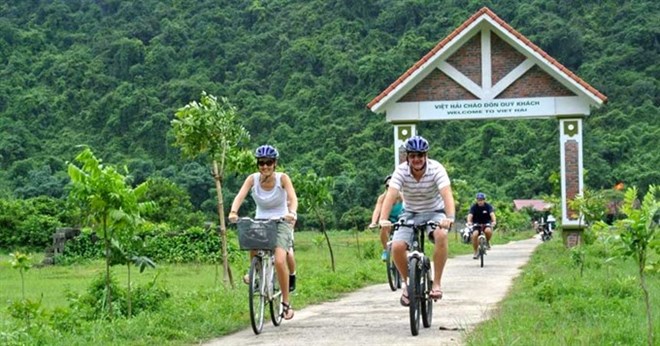



Foreign tourists enjoy cycling in Viet Hai Village, Cat Ba Island.
(Photo: goodmorningcatba.com)
The elite travel startup competition, supported by the Australian
Government and Asian Development Bank, includes Asia’s most prominent travel-specialised
venture capitalists among its advisors.
MIST’s second prize comes with a 5,000 USD innovation grant.
Ecohost enables quality tourism experiences in Vietnam’s countryside, working
village-by-village to develop tours and activities while improving the capacity
of rural homestays to serve international guests.
"The MIST innovation grant will enable us to deliver skills training courses
across three villages and upgrading homestays for 15 families,” said Ecohost
CEO Bui Thi Nhan.
Ecohost came in second to BambooLao from Luang Prabang, Laos. BambooLao is on a
mission to eliminate single-use plastics from hotels and resorts across Asia.
They have produced more than 80,000 reusable bamboo straws and other bamboo
utensils, using indigenous bamboo varieties and a proprietary natural treatment
process.
MIST supports high-growth-potential emerging market startups in travel and
hospitality – especially startups that generate positive impacts for
communities, culture, and the environment. The programme’s five 2018 finalists
refined their business acumen and pitching skills during MIST’s week-long
business fundamentals bootcamp, five months of customised coaching by industry
experts, and MIST pitch competitions in Ho Chi Minh City, Nakhon Phanom, Thailand,
and ITB-Asia’s Mekong Travel Startup Forum in Singapore.
"BambooLao, Ecohost, and other MIST finalists demonstrate how the Mekong
region’s bright, innovative entrepreneurs are finding practical solutions to
solve industry problems, while striving to make tourism more inclusive and
sustainable," said Jens Thraenhart, co-organiser of MIST and executive
director of the Mekong Tourism Coordinating Office.
Source: VNA